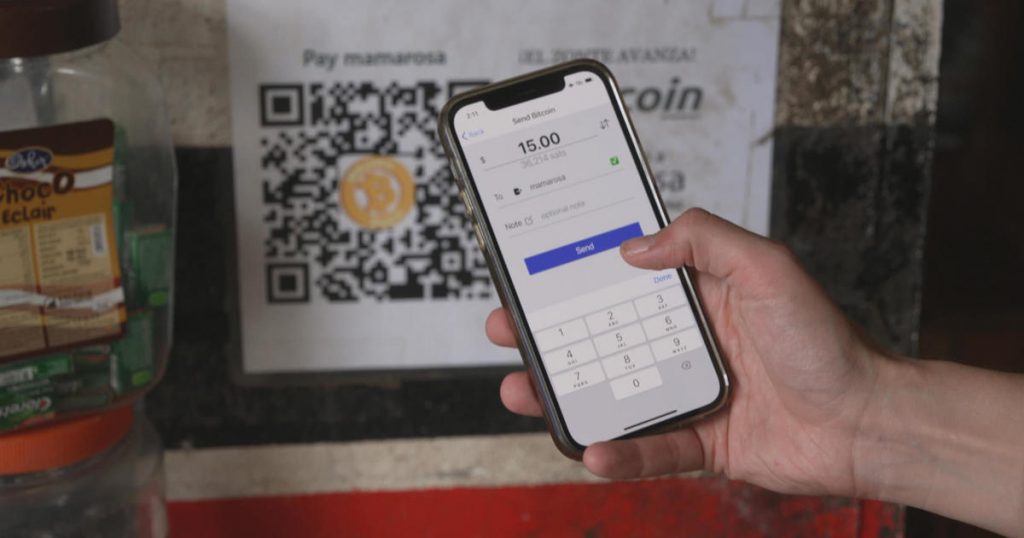
This week on 60 Minutes, correspondent Sharyn Alfonsi traveled to “Bitcoin Beach,” a small coastal town in El Salvador called El Zonte that has created a bitcoin economy. El Zonte is one of the first places in the world where the cryptocurrency bitcoin can be used to pay for just about anything.
American Mike Peterson, a former financial planner who moved to El Salvador, is the man behind the initiative. He told 60 Minutes his vision was for vendors to accept the currency, then pay their employees in it, which the employee could use to pay for things like utilities electronically.
“That was the goal, [a] circular economy with bitcoin, and everybody said we couldn’t do it,” Peterson told Alfonsi. “But, you know, you guys are here, and you see the results.”
To make it happen, Peterson needed to get locals on board with his plan. He got help when, out of the blue, someone offered to launch a purpose-built bitcoin wallet app for El Zonte. That someone was Chris Hunter, a tech entrepreneur who saw an opportunity to deliver a faster and cheaper way to transact with bitcoin using the new Lightning Network.
Before connecting with Peterson and El Zonte, Hunter says he had shopped his idea to venture capitalists, who told him that he was five years ahead of his time.
“They acknowledged that the technology existed, but they thought it was simply academic or not usable for people in the real world in the year 2020,” Hunter said.
After being rejected by every venture capitalist his company approached, Hunter said he read an article about Peterson in Forbes. He cold-called Peterson and told him his company, Galoy, would custom-build a wallet app for El Zonte and do it pro bono.
Peterson accepted Hunter’s offer. Hunter and his Galoy team knew the wallet had to be an easy-to-use experience that, at its most basic level, helped locals save and spend their money through bitcoin. About 70% of El Salvadorans are unbanked, and most businesses do not have a credit card terminal.
“In a cash economy, introducing something novel like bitcoin in a wallet there, you have to have a good user experience in order for them to actually adopt it,” Hunter said. “Otherwise, they’ll just push it to the side.”
The result was Bitcoin Beach Wallet. Prior to the Hunter’s app, bitcoin transactions in El Zonte were both slow and expensive. They relied completely on the bitcoin blockchain, which Hunter estimates took approximately 30 minutes for final settlement. That means a person who bought a coffee with bitcoin had to wait half an hour for their funds to move into the merchant’s account.
Instead, Hunter’s new wallet app took advantage of the Lightning Network layered on top of bitcoin’s blockchain, a technology that expedites the transaction process. Bitcoin alone can process about seven transactions per second. When the Lightning Network is included, that figure approaches 1 million transactions per second.
“Lightning is a layer on top of bitcoin that allows for these effectively free, instant settlements — something that’s actually faster than a credit card transaction,” Hunter said.
Hunter’s Bitcoin Beach Wallet is different from El Salvador’s state-backed wallet Chivo, which launched in September 2021. That is when President Nayib Bukele put a law into effect requiring Salvadoran businesses to accept bitcoin, making El Salvador the first country in the world to make cryptocurrency legal tender. Unlike Bitcoin Beach, Chivo is not open source.
Bitcoin Beach Wallet is now the most popular way to use bitcoin in El Zonte. The experience of using it feels similar to Venmo or Apple Pay. Even though users pay with bitcoin, the wallet shows the equivalent value of the transaction in any currency, so they know exactly how much they are spending. It also includes a map that shows users which vendors accept bitcoin.
It may all feel very high-tech for a beach town with no paved roads. But Hunter and Peterson are betting that, if the bitcoin economy works in El Zonte, it may be a sign of things to come everywhere else.
“It is a proof of concept,” Hunter said. “It is a postcard from the future.”





























